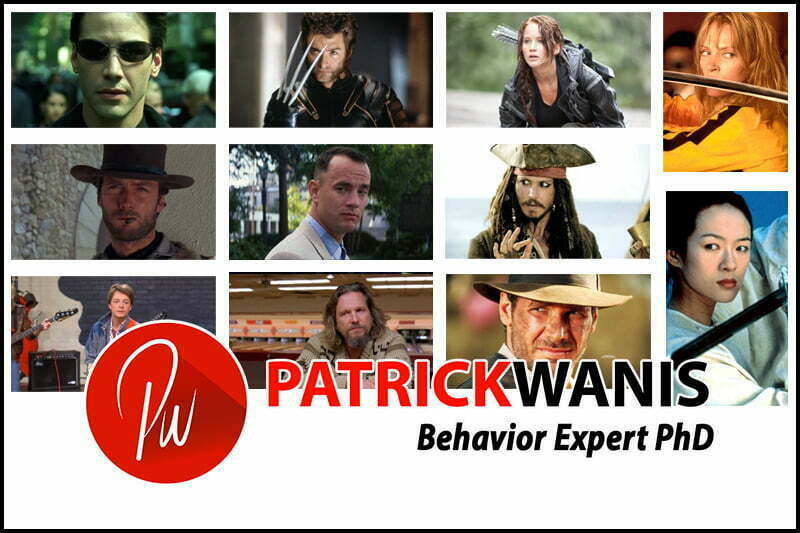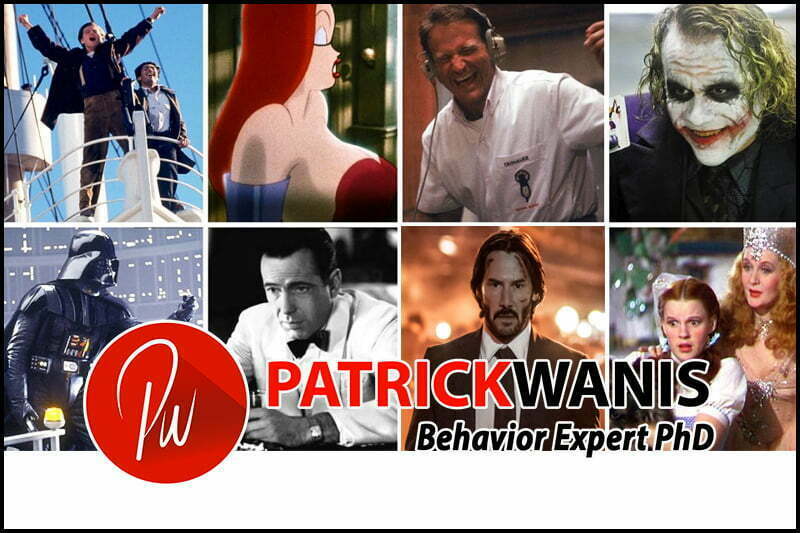
What forms the bond between a viewer and a TV or movie character?
Why do people identify with a particular fictional character and/or feel that they are that character or believe that the character is a real person?
Behavior and relationship expert Patrick Wanis, PhD shares insights into fandom and the strange bond people create with fictional characters in this edited transcript:
There are 5 key elements that I have identified that I believe explain why and how we identify and bond with fictional characters in movies and TV shows:
1. Values & motivators of the character that reflect your own
2. Personality & temperament of the character that matches your own or is something you aspire to be
3. Empathy & Emotional connection – you empathize for the character, you share or relate to the dominant emotions and responses of the character and you have a fascination with villains and anti-heroes, as well as heroes and underdogs
4. Parallel experiences – you are experiencing or have experienced similar events, challenges or pain in our lives as the character
5. Alleviating pain and escapism – the characters offer you the opportunity and vessel to escape who you currently are, and the means to have new experiences (usually empowerment) via the character
Parasocial Relationships – one-sided relationships
People also form parasocial relationships with characters. Parasocial relationships are common in the context of relationships between fans and celebrities. But here, it’s a character that’s played by a celebrity, and you’ve formed a one-sided relationship with this character. You believe that they exist, you believe that you actually know them, you believe that you understand them or you know how they think. And that is known as a parasocial relationship; that character doesn’t know you even exist, and yet you ‘feel’ and believe that you know them and have a relationship with them and therefore, you want to know everything about them and their emotions and experiences; their story deeply affects you.
The way you form a parasocial relationship with a character or celebrity is because of the five factors I mentioned, including your emotional connection to them. And your emotional connection occurs through empathy, as well as via mirror neurons.
Empathy is your ability to feel what someone else is feeling: you can feel the anger of the villain, you can feel the pain and the suffering of the victim or hero; you can feel the fight of the hero to survive or to rescue someone. That’s the experience of empathy.
Mirror neurons is your capacity to replicate in our body what you see in someone else – in their emotion or their actions. So, for example, if you’re watching a sports game and one of the athletes jumps and then falls on his or her back and you feel that same pain in your back or you say, “Whoa, that must have hurt.” And the reason you’re saying that is because your brain looked at this person, at the action and at the expression on their face, and it replicated it, and therefore you felt it.
The reason that we all have that ability is so that when we meet a stranger we can determine quickly whether or not this person is safe or is a threat to us. And that’s why you see a friend and you say, “You look sad,” and the person responds, ‘No, no, I’m not.’ “Yeah, you look sad. What’s wrong?” Or you might say ‘you look tired’ or ‘you look angry’; you can do this without taking a special course on how to read people’s faces because every one of us has that ability to read other people.
When you’re watching a movie, you also start to feel and replicate within you everything that’s happening, including the emotions. But what determines whether or not you’re going to identify and then form a bond and deep connection with that character is the five key factors that I mentioned such as motivators and values.
There are seven key motivators:
1. Aesthetic is the motivation/desire for Form, Harmony, Beauty, Balance
2. Economic is the motivation/desire for Money, Practical results, Return on investment
3. Individualistic is the motivation/desire for Independence, Uniqueness
4. Political is the motivation/desire for Control, Power, Influence
5. Altruistic is the motivation/desire for Altruism, Service, Helping others
6. Regulatory is the motivation/desire for Structure, Order, Routine
7. Theoretical is the motivation/desire for Knowledge, Learning, Understanding
“Life is like a box of chocolates; you never know what you gonna get” – Forrest Gump
For example, there’s a fictional character and the reason you really relate or connect to them is because they have similar motivators and similar values to you and/or they’re also helping you to expand or change the way you see things. Perhaps as that character grows and evolves in the show you feel that you’re evolving with them, and maybe you even begin to do things differently in life.
I’m sure that this has happened to you, I think it’s happened to everyone that’s ever watched a TV or movie. We go around quoting sayings and expressions. And sometimes we just do it for fun like – “Say hello to my little friend”, from Scarface. Or other times when we’re quoting something that’s deeper and more meaningful, and we remember that quote and sometimes we remind ourselves of that quote, when we say “Life is like a box of chocolates; you never know what you gonna get.”, and something that seems so simple has meaning because it reminds us that life is full of surprises – you don’t know what you’re going to get. Thus, we can learn from those characters.
Can you identify your primary motivators?
I recall many years ago I stopped and pondered, “Why do I love Mel Gibson’s characters so much?” I recognized that I bonded and strongly identified with them, and I was surprised that I was doing that – primarily because I never grew up with a strong role model. And then I realized that I connected with Mel Gibson’s onscreen characters because of the values and the motivators of that character – they were in alignment with mine – justice, doing the right thing, saving the innocent victim, or suffering over the loss of a loved one, which if you recall in Mad Max and Lethal Weapon the woman that he loves is murdered by someone evil, and then that becomes his drive, that becomes his reason to live and his reason to do the right thing. His characters have 2 key motivations – Altruism and Individualism – with which I strongly identify.
Storyline
The reason you get wrapped up in shows and movies is also attributed to the storyline: perhaps an escape, or a mirror of things that are happening in your life; the storyline might represent your ideals, the storyline might represent a way for you to also process your own emotions.
Sometimes when we’re feeling sad we actually want to watch a sad movie, because we’re trying to connect to those emotions. And at other times we say, “No, no, I just want to watch a comedy,” because I don’t want to go there, I don’t want to feel the sadness or the pain I’m experiencing so I just want to escape by watching a comedy. Thus, we can turn to movies to escape a feeling or we can turn to a movie help us to connect and feel, experience, and process that emotion.
Accordingly, you subject yourself to those emotions in the movie to understand and process, and to learn to even cope with your own emotions. Or if you’re feeling sad, you want to watch a sad movie so that you can actually allow yourself to experience that emotion at a deeper level, in the hope of validating, processing and moving through it.

Experience-Taking
Another element which assists you (subconsciously) to relate and bond with a character is known as experience-taking whereby you adopt the identity and consciousness of the character – thoughts, feelings, beliefs, behaviors and internal responses. However, as studies reveal, this happens when reading a book versus watching a movie of the same story and characters. Perhaps this can be attributed to the deep and detailed explanation of a character (thoughts, feelings, internal responses) in a book which are not easily translated to screen and are obviously often completely or greatly omitted due to the constraints of the visual medium and length of the movie. Experience-taking often results in a reader making changes in his/her life based on the new identity and experience of the fictional literary character. Experience-taking is an unconscious, immersive process which can be contrasted with perspective-taking. In the former, a reader becomes the character (releasing his/her own identity) and in the latter, the viewer empathizes and takes the perspective of the character but doesn’t lose his/her own identity.
Coping with loss
There are two ways to cope with a loss of character in a movie: 1. either you try to reprogram your brain and mind and say, “It’s a character, I’m going to feel nothing” or 2. you look at it and say, “I’m going to learn from it” – in the sense that you’re going to process that loss the same way you would process a loss in real life. The way that you respond to it can be a reflection of the way you respond to loss in real life.
The brain can’t differentiate between a relationship with a fictional character and a relationship with a real person; if it could you would not feel anything for the character while watching the movie; you would not experience the emotions or fight for or against that character; you would not cry, become angry or sad or even attracted to that character; you would not cry when that character dies in the movie.
Anointed “The Woman Expert” by WGN Chicago, Patrick Wanis PhD is a renowned Celebrity Life Coach, Human Behavior & Relationship Expert who developed SRTT therapy (Subconscious Rapid Transformation Technique) and is teaching it to other practitioners. Wanis’ clientele ranges from celebrities and CEOs to housewives and teenagers. CNN, BBC, FOX News, MSNBC & major news outlets worldwide consult Wanis for his expert insights and analysis on sexuality, human behavior and women’s issues. Wanis is the first person ever to do hypnotherapy on national TV – on the Montel Williams show.
